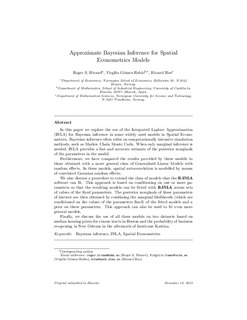Approximate Bayesian inference for spatial econometrics models
Journal article, Peer reviewed
Accepted version

View/
Date
2014Metadata
Show full item recordCollections
- Institutt for matematiske fag [2354]
- Publikasjoner fra CRIStin - NTNU [37236]
Abstract
In this paper we explore the use of the Integrated Laplace Approximation (INLA) for Bayesian inference in some widely used models in Spatial Econometrics. Bayesian inference often relies on computationally intensive simulation methods, such as Markov Chain Monte Carlo. When only marginal inference is needed, INLA provides a fast and accurate estimate of the posterior marginals of the parameters in the model.Furthermore, we have compared the results provided by these models to those obtained with a more general class of Generalised Linear Models with random effects. In these models, spatial autocorrelation is modelled by means of correlated Gaussian random effects. We also discuss a procedure to extend the class of models that the R-INLA software can fit. This approach is based on conditioning on one or more parameters so that the resulting models can be fitted with R-INLA across sets of values of the fixed parameters. The posterior marginals of these parameters of interest are then obtained by combining the marginal likelihoods (which are conditioned on the values of the parameters fixed) of the fitted models and a prior on these parameters. This approach can also be used to fit even more general models. Finally, we discuss the use of all these models on two datasets based on median housing prices for census tracts in Boston and the probability of business re-opening in New Orleans in the aftermath of hurricane Katrina.